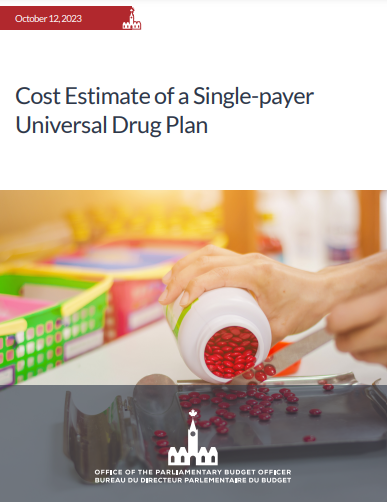Budget officer estimates cost and savings of single-payer pharmacare
The analysts in the Office of the Parliamentary Budget Officer sharpened their pencils to estimate the total and incremental public cost of a single-payer universal drug plan – “Pharmacare” – over 2023-24 to 2027-28. Their findings were released October 12, 2023 in Ottawa, and landed in the middle of the hot debate over anticipated federal government pharmacare legislation this fall.
- The PBO says, “Upon the implementation of a single-payer universal drug plan… we estimate the incremental cost to the public sector (that is, federal and provincial governments) combined to be $11.2 billion in 2024-25, increasing to $14.4 billion in 2027.”
- In terms of the economy as a whole, the PBO estimates cost savings on drug expenditures of $1.4 billion in 2024-25, rising to $2.2 billion in 2027-28.
It’s important to note that the cost estimates are incremental, or money required in addition to the amounts already spent by provincial governments (and to a lesser degree, federal). The full amount, the PBO calculates will be $33.2 billion in 2024-25. A federal single-payer pharmacare program will require cooperation with provinces, where the proportion of costs paid by the two levels of government will have to be negotiated.

Cost Estimate of a Single-payer Universal Drug Plan
Office of the Parliamentary Budget Officer
Lisa Barkova; Carleigh Busby
Published on October 12, 2023
Read (PDF)
What does single-payer mean?
The PBO report bases its estimates on a single-payer system where the government pays the cost of prescription medication, just as it does for patients in a hospital. Implementing single-payer pharmacare will mean that most prescription drugs purchased outside of hospitals that are currently covered privately through health insurance or out-of-pocket by patients, will be transferred to the government.
The PBO says in 2021-2022 about 46 per cent ($16.9 billion) of total prescription drug expenditure was covered by public sources [i.e. governments]; 40 per cent ($14.7 billion) by private insurance; and the remaining 14 per cent ($4.9 billion) was paid for out-of-pocket.
How does a single-payer system reduce drug costs?
A single-payer system can negotiate cheaper prices from pharmaceutical companies and avoid using more expensive brand-name drugs. This will lower the amount paid for drugs to manufacturers in Canada substantially.
“While there are incremental costs to the public sector resulting from the transfer of expenditures currently covered by the private insurance and out-of-pocket outlays, economy-wide spending on the drugs listed on the formulary [i.e. the list of covered medications] is estimated to be lower,” says the PBO report.
Other highlights from the PBO study:
- “According to Health Canada, prices for prescription drugs in Canada are roughly 25 per cent above the median of Organisation for Economic Cooperation and Development (OECD) countries.”
- “An increase in the number of prescriptions being filled is expected under Pharmacare, resulting from point-of-sale price reductions to low or zero copayment. Prices borne directly by patients are expected to fall by 47 per cent to 100 per cent, which results in overall increases in the utilization of prescription drugs of 13.5 per cent.”
- “We assume a single public payer would be able to negotiate an additional discount consistent with current confidential rebates that provincial governments are able to negotiate with drug companies. This discount is assumed to be 20 per cent for brand-name drugs and 25 per cent for drugs that are new to the Canadian market.”
Current and former health ministers react
Following the PBO report, former Ontario Health Minister Dr. Eric Hoskins wrote in The Globe and Mail, “Our 2019 report concluded that the most effective model – and the one that results in the greatest savings to both the health care system and taxpayers – is a public system where the added costs of pharmacare are paid for by the federal government. As a single-payer, the government has the purchasing power to negotiate the lowest drug prices.”
Former federal Health Minister Dr. Jane Philpott told CPAC, “The best model for Canada to save money and make sure people get the medication they need is what we call a universal single-payer system and so I’m happy to see that there’s a a lot of push in that direction and that’s very much what many of us are hoping to see out of the government in the coming months.”
The current federal Health Minister Mark Holland, who is expected to introduce legislation for pharmacare in the coming days, focused on the incremental cost of single-payer pharmacare, telling iPolitics, “What I’m moved by is… what are the most effective things we can do to make pharmaceuticals less expensive for people? What are the most effective actions that we can take that are the most cost effective now and what are the most reasonable, given our fiscal constraints? And that’s the way you have to come at it.”
The recent warning by the NDP that anything less than single-payer pharmacare legislation will result in the agreement between Liberals and the NDP unraveling has raised the political stakes. The PBO study arrives at a crucial moment in the decades-long campaign for universal pharmacare.



